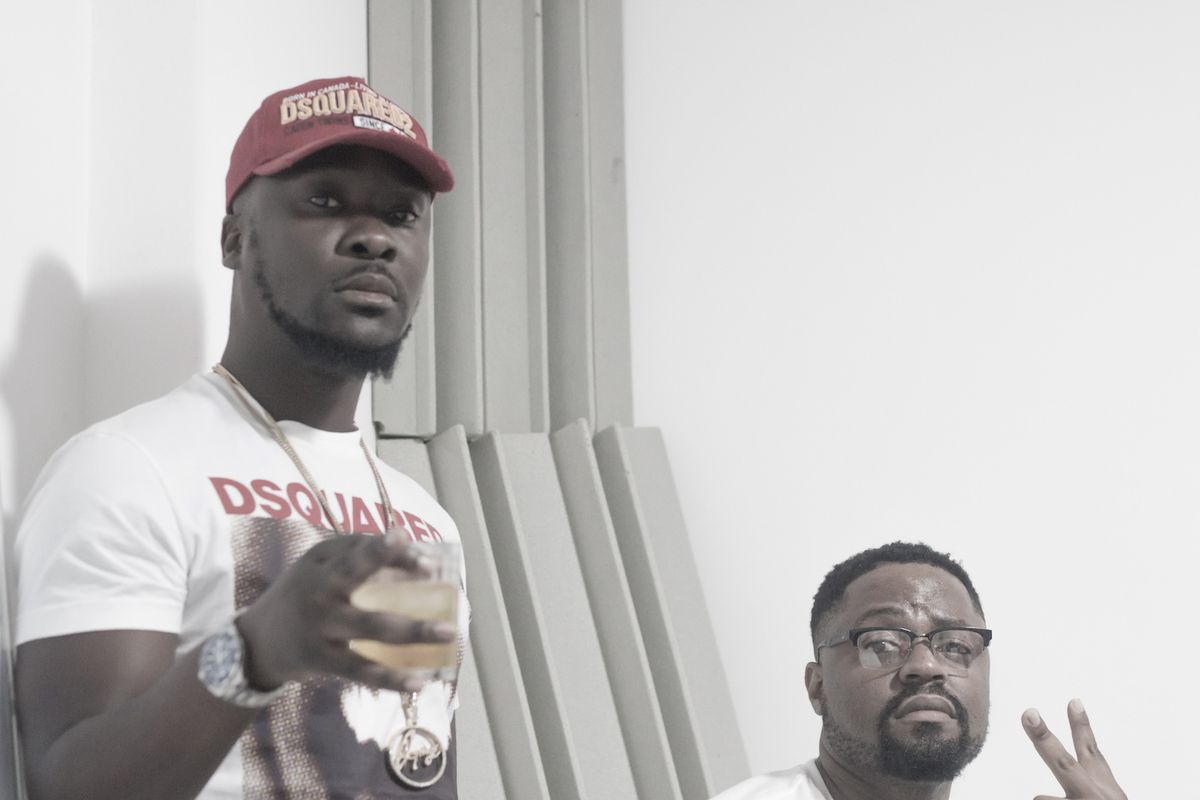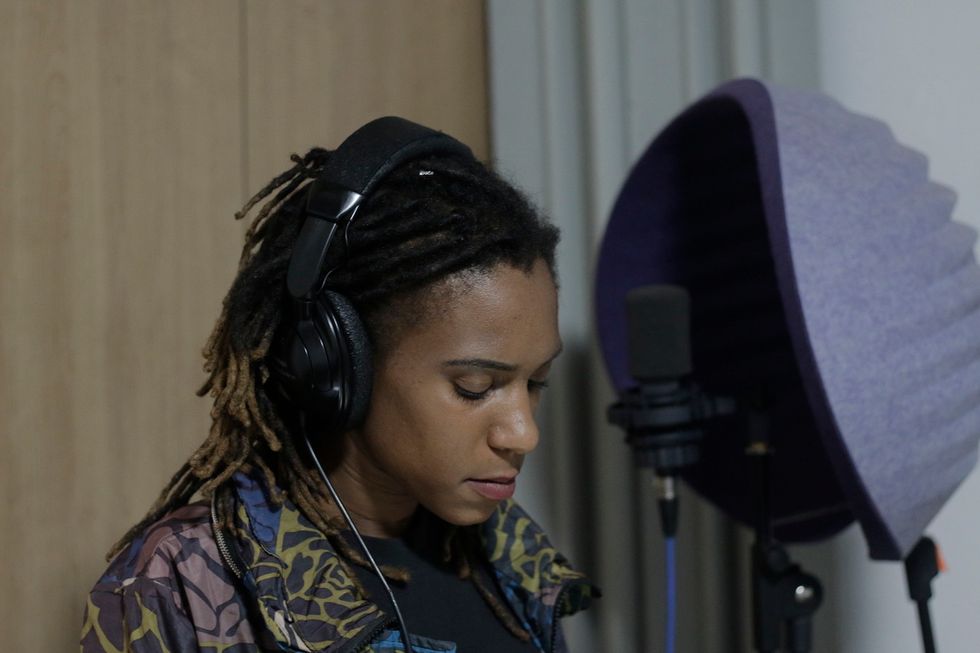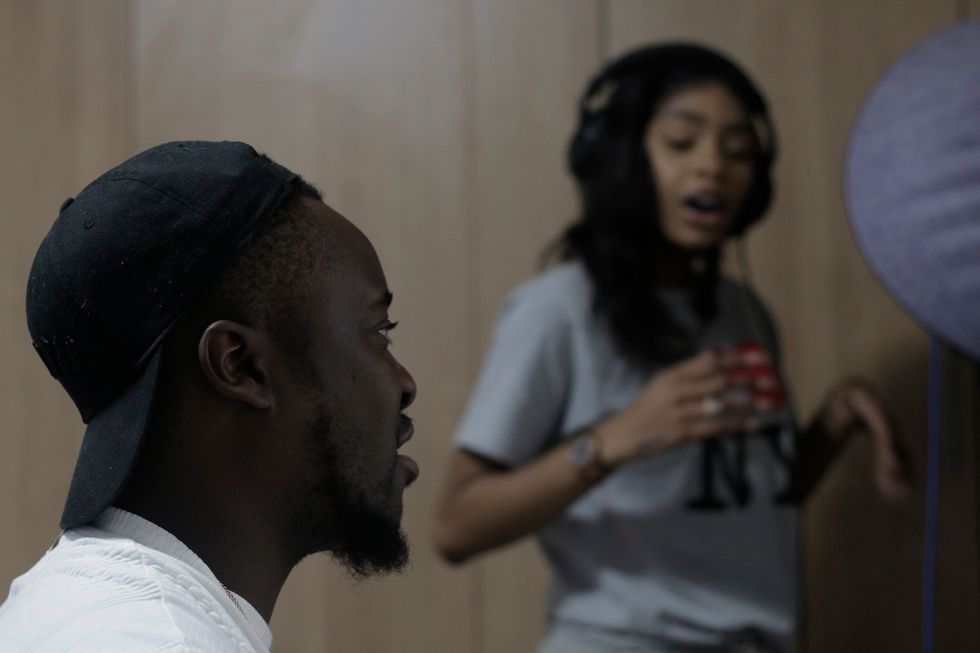[Interview] ‘Pungwe Sessions Volume II’: an Ear into Zimbabwe's Music Scene
Zimbabwean entrepreneur and music impresario Phil Chard gives us an inside look into the collaborative project 'Pungwe Sessions Volume II.'

Rhymez and Phil Chard.
Point Black Entertainment's Phil Chardis an entrepreneur and music impresario with the lofty aspirations of placing Zimbabwean music on a global stage while simultaneously developing the country's fledgling industry.
The result of plotting towards these dual goals is the second installment of Pungwe Sessions, a musical endeavour with the pressing ethos of artist empowerment. "A Pungwe is a night vigil where people gather around the fire, staying up all night,'' Phil Chard says. "Within that is a communal sense as it involves sharing music and conversation. It's basically a communal gathering'' he expands.
Produced with the assistance of Goethe-Zentrum Harare, the 13-track project is an assortment of afropop, dancehall and hip-hop crafted by a colourful mix of both Zim's upcoming and veteran talent.
With the recording process helmed across eight days by decorated producer Rymez, these sessions brought together over 20 artists, including Ammara Brown, Nutty O and Simba Tagz, whose output was firmly rooted in the spirit of collaboration—a communal exchange of art. We caught up with the Mutare-born Chard to get some insights into the realisation of his brainchild.
This interview has been edited for clarity and length.
When did the Pungwe Sessions idea first arise?
That was probably eight years ago. I had known of Rymez from when I used to do some work with a rapper called Tekneek back in the day. He had just done some stuff with Tinie Tempah who was starting to blow up with ''Pass Out." I had started writing for the [now-defunct] African Hip Hop Blog and thought it would be a great time for an interview. We kept in contact and one day he was like, "yo dude, I see what you guys are doing out there, especially with helping rappers get on. I want to do something too so if there's a way I could produce a project lets do it." We tried that with Pungwe Sessions Volume I, but quickly realised that the fact that Rymez wasn't in studio meant it lost something.
How did you go about Volume II differently, after that initial experience?
We really had no resources then. We knew what a publicist was and what a radio plugger was but didn't know how to utilise them. We were like, "let's put a hold on this," 'cause we were just dumping money into it. The plan had always been to go back to that idea and once we got back into that headspace it was now like "we're not gonna lose money making this anymore, we need to have a business strategy and business plan in place." My strategy was to approach arts organisations and, at that point I had experience in marketing, content creation and I'd gone back to school. My whole thing was, I knew these guys had budgets set aside for arts creation and empowering artists for example. The only thing I'd noticed is the music they made is music no one really listens to. You'll find a project and it will only circulate within your art sectors but doesn't really create any tangible benefits for artists. The songs won't get airplay or played in sets and those are the avenues that actually earn artists money.
The Making of The Pungwe Sessions Vol. IIyoutu.be
Was this you applying the theory you'd attained from heading back to school?
Well, kind of. What I did in my Dartmouth fellowship was Business and Entrepreneurship and it was a lot of online related projects. So it wasn't directly influenced by music but there was stuff you could pick and apply to music. I compiled a 20 page quasi-thesis of the reasons why we need to invest in African artists. I was really just outlining the way it needs to be done; not just by injecting cash but injecting knowledge and expertise in management, publishing, distribution and PR.
How did you get buy-in from Goethe-Zentrum Harare?
The pitch that I went to them with was: "I've got a business and a different goal from other organisations because I have no interest in starting a trust. I mean to operate this project under my business and if need be I'll put my money where my mouth is." I thought if I had a vested interest and they had a vested interest, that would guarantee our success.
What benefits did the artists have from participating in the project and what does it mean for the scene at large?
So the whole plan was to get a house, get all the artists to come to the house everyday and make sure they have nothing to worry about. Just make sure we're creating a conducive environment for creativity to happen. It was a really good environment to be in. I think because Rymez has a different workflow from what the artists might be used to, they were able to develop different sounds. From my point of view, getting an opportunity to work in studio with a platinum selling producer for free and you own the music, I would jump at that chance. There was definitely an energy and vibe because artists got to hang around their peers and people they've always wanted to work with. There were a lot of conversations about future collaborations. What we hope is that we at least lay the foundation that shows artists that this is the type of work we can create and display to the world. Over the long term, once the payments start coming in, the artists can see how much they stand to make if they know the right processes to follow. Hopefully having a Rymez collaboration on their bios will also lead to more doors opening for them.

How did you go about crafting the songs and pairing collaborators?
It was an organic creative process. I think A&R is just about putting the right creatives in the right room and letting them do their jobs. If you try get too many hands on too early, you stifle their creative process. Of course Goethe was great in allowing us creative freedom so I didn't want to be too heavy handed when it came to creativity. I was very cognisant of all that, so all we did was schedule blocks and the artists would come listen to beats. If they heard a beat and started vibing to it, that's what we did.
Another aspect of the Pungwe Sessions is the empowerment angle. Take us through that.
That's another thing that we did as part of the program. To show that we were focused on empowering artists, we designed contracts that give the artist 100% control of the publishing of the music. So, all the publishing revenue these songs generate goes directly to the artists. We also partnered with Shoko Festival and they gave us a slot for the formal aspect of these conversations. Outside of Rymez having a chance to speak to artists, not just the artists involved, but artists in general because it was open to the public. We flew in Wiseman Ngubo, the COO of CAPASSO, had an artist from the Netherlands, artist managers like Michael Mangandeza, Keen Mushapaidze and Pedzi Chimbwanda and one half of 2 Broke Twimbos Danny that Guy.

What are the targets you're hoping to achieve with the new project?
Our focus right now is creating good content and creating a template. One of the things I realised through my research is that we don't actually know how big the African music industry is. It's very easy for me to find data on overseas music markets, almost down to the hour. On the contrary, it's really difficult to do that for Africa. It's difficult to figure out how much revenue the industry is generating in totality. So, if we invest in the Zimbabwean music industry, what is our expected return on investment? We simply have no idea of these figures. So, essentially an artist doesn't know the value of their own art and what it's worth. There's just a lot of foundational work that needs to be done and this is our way of doing it. Not only are we building valuable catalogues, we're also gathering valuable information and disseminating that information to the artists for free.
What has the response to the album been so far?
We didn't really have any expectations because we're starting on a blank slate. We were able to use my company's existing distribution deal with Africori and the team over there are on their A-Game. Lo and behold, "Pungwe Music" was able to get onto some of the biggest playlists on the continent. I think that was really helpful in exposing the music to a whole new audience.
Listen to Pungwe Sessions Volume II on Apple Music and Spotify.
For more information, visit the Point Black Entertainment website.

